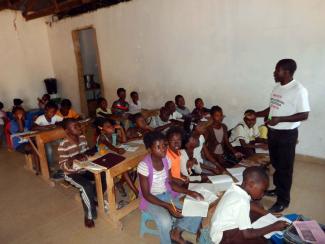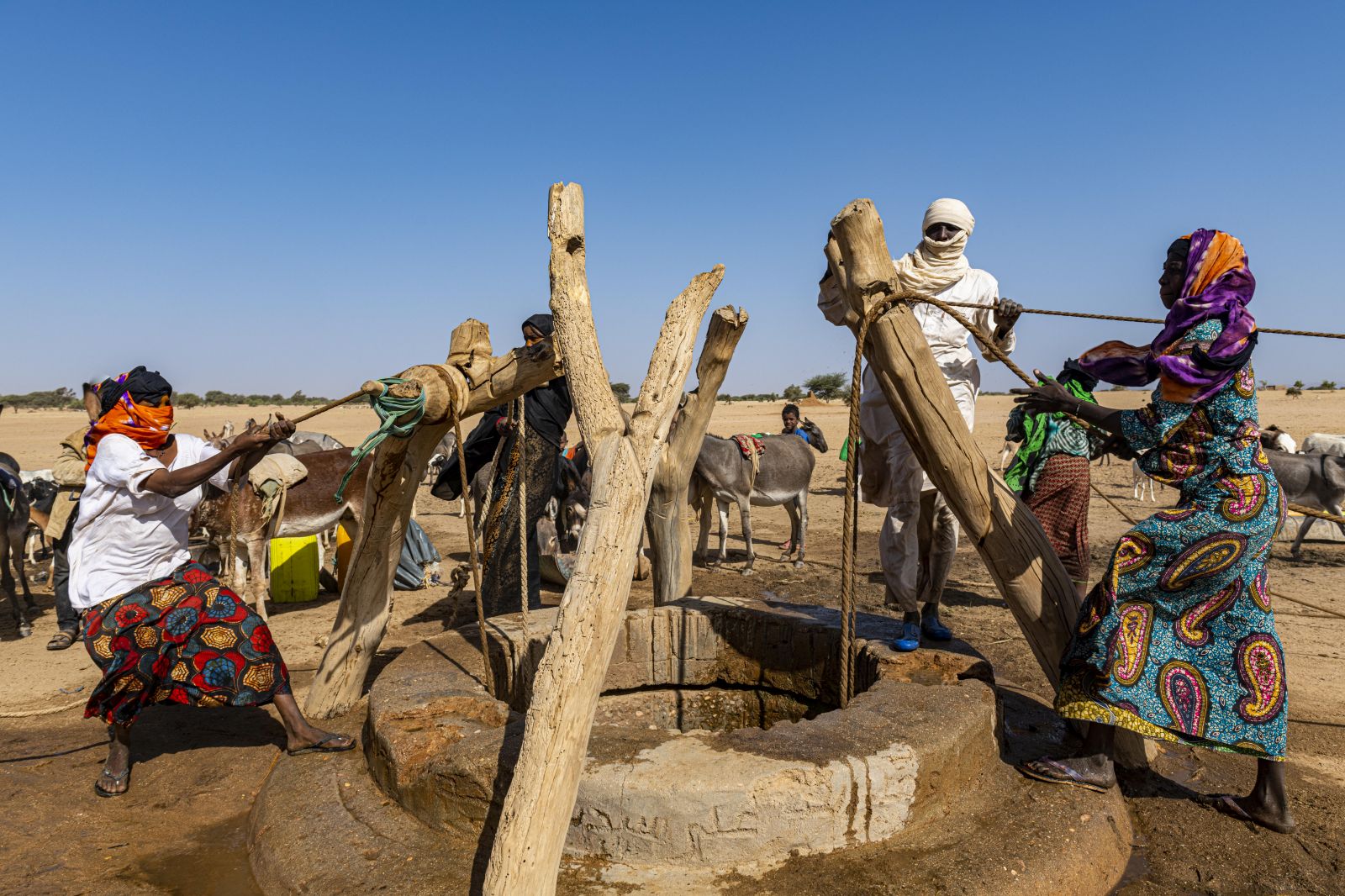Charity School
Education for all children

Ng’ombe is one of the agglomeration’s poorer areas with a population of about 70,000 residents according to the central statistical office. In spite of this number, there are only two government schools in Ng’ombe, both of which are overcrowded and underfunded.
The government schools charge 150 kwacha per term (about € 54 per year) and require students to wear uniforms, which must be purchased by the pupils’ families. In a country with the unemployment rate hovering at around 70 %, money is scarce. Many parents simply cannot afford the fees and school supplies. Even those fortunate enough to have employment struggle with school costs. The majority earn less than 400 kwacha per month.
The general situation for people living in Ng’ombe is difficult; most of the housing units have dirt floors. Households tend to lack electricity and running water. The sanitation infrastructure is inadequate, and health problems abound (also see article on health situation in Ng'ombe).
Poverty is clearly at the root of the problems in Ng’ombe, and it leads people to make decisions that can have devastating consequences for children. Parents who cannot afford school fees and uniforms, for instance, tend to simply send children to work. Unfortunately, stone crushing is the most common job for children. They pound rocks into pebbles for construction companies. Local people speak of “hitting stones”.
#Some parents try to keep their children in school by taking loans. Schools hand out credits for fees and uniforms. Often, however, the parents still have no money when the payments are due. Typically, they then take the children from the school and try the credit routine at another one. The children get frustrated because they cannot learn consistently. Another result is a culture of dependency: people come to expect things without payment or sacrifice, and the subsequent attitude of entitlement serves only to drain resources in an already poor community.
Government failure
The local community wants the government to provide sufficient schools. Obviously, the 2030 Agenda of the Sustainable Development Goals (SDGs) also implies that all children should be able to finish school in places like Ng’ombe. Nevertheless, Zambian government policies and procedures remain inconsistent and unenforced. Girls in particular do not get the schooling they deserve.
Government schools lack infrastructure, supplies, staff and facilities. Corruption is a problem. Teachers expect bribes, and that hampers equitable, long-term enrolment of children. A teacher may, for example, require bribes in form of a sack of cornmeal in exchange for marking students’ exams, so that the students can progress to the next grade. Unless families produce the cornmeal, their kids’ academic careers may thus end before they even finish primary school.
Many families therefore depend on community and charity schools for the education of their children. But even to attend these schools, some money is needed. And that is more than some families can come up with.
Whichever political party happens to be in power at any given time, it is likely to prioritise measures that are visible and tangible. The political leaders want to be re-elected after all. In Zambia, this has translated into funding for roads and the construction of large shopping complexes in recent years. The problem with this is that most Zambians do not own cars, and very few of them can afford to shop at a mall. Primary education, however, is low on the agenda of those in power since the general public cannot readily see or touch the results.
Private commitment
I have three children. Four years ago, I had no job and was unable to pay for schooling. I was familiar with a school room in Ng’ombe that had been closed and was vacant. I wanted to reopen the school and run it myself. The owner of the building agreed, but in order to pay the rent, I had to find sponsors within the community. To supplement the little money I could garner from people in Ng’ombe, I sold books of my own and did piecework making bricks.
Soon the school was able to open with fifteen students. They agreed to the fee of three dollars per year. Still, additional finances had to be generated, so I looked for some outside sources, including at the International School of Lusaka (ISL). The community service coordinators at ISL visited my new Sun-spring Charity School and had faith in my vision. They began to assist the school with materials and weekly visits by ISL student volunteers. At present, there are 100 students at the school, but the financial situation remains precarious. We are grateful to get some support from our sister school, the American International School of Rotterdam in the Netherlands.
An ironic obstacle is that Zambians assume that a school must have quite a bit of money if they see white people involved in its affairs or know it is getting supplies. This attitude is harmful. All too often, local people assume that our school no longer needs their fees.
I managed to procure sponsor money to have windows and floor tiles installed in the building. The owner of the building should have been grateful, but he fast demanded a higher rent, given that his property had become more valuable. He could easily find a tenant willing to pay more. However, I could convince him that his action would be inhuman and exploiting; I also had to remind him of the agreement we signed that he could not increase rentals nor remove the school from using the building during its tenure.
With enrolment rising at Sun-spring, I needed an admissions policy. I am in touch with Beatrice Malembeka of the Ng’ombe ward development committee, and she works with the Lusaka city council. Beatrice and I now cooperate on identifying the most vulnerable and needy children in the neighbourhood and visit the homes of applicants. To Sun-spring, we admit those children for whom it is impossible to attend a government or community school. The problem is that approximately 50 % of them are unable to pay the meagre fees. Anyway, the school decided to award 70 % of students free education, remaining with 30 % of the students from better backgrounds to be contributing school sustenance fees with a goal to make education possible for the poorer children. Donations of organisations like the American International School of Rotterdam help us manage to pay school operation bills.
Respect and good manners
The Sun-spring Charity School wants to provide the most comprehensive education possible, and it hopes to eventually get government funding. Accordingly, we adhere to Zambia’s national curriculum, which focuses primarily on English, science and mathematics. Our pupils lack textbooks, however, and sometimes even finding a piece of chalk is a challenge. Our team strives to empower all children of Ng’ombe with literacy nonetheless. The ultimate goal is to allow all of them to finish grade seven. Sun-spring Charity School inspires and involves youths in the community to make a difference as volunteer teachers who get monthly stipends. Sometimes these teachers only volunteer for a term and proceed on exploring other well-paying job opportunities beyond the school. However, the school contributes in creating jobs for unemployed youths in the community and enhances their work experience. The only challenge is that most of these volunteer teachers are untrained.
Under the Actions for Children Together (ACT) campaign, through which I am calling for collective actions to make education possible for all children through walks and other initiatives such as play for kids, we have come up with an initiative called Teachers for All (TfA). It calls for more youth volunteers and equips them with basic teaching skills in partnership with the International School of Lusaka (ISL) to help ensure Education for All by addressing teacher shortage challenges.
In addition to the academic expectations, Sun-spring emphasises social education. It reinforces the importance of respect and good manners. One result is that the local community is increasingly interested in our work. It matters even more that Sun-spring offers children a safe haven from the abuses that haunt poverty-stricken settlements.
Frank Masanta Jr. is a community leader and activist in Zambia. He started the Sun-spring Charity School in 2011. He told his story to Kenneth Muller, who wrote it down.
frankmasanta.jr@gmail.com
Kenneth Muller teaches English and history at the American International School of Rotterdam and previously worked for the International School of Lusaka (ISL). He was one of the ISL volunteers at Sun-spring, and is now engaged in projects to raise awareness and funding for Sun-spring in the Netherlands.
kenneth.muller@aisr.nl
Link:
Facebook page of Sun-spring Charity School:
https://www.facebook.com/Sun-spring-Charity-School-150168021809120/













